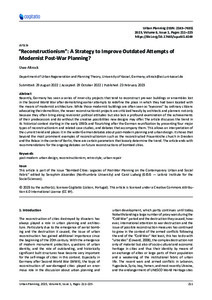“Reconstructionism”: A Strategy to Improve Outdated Attempts of Modernist Post‐War Planning?
| dc.date.accessioned | 2023-07-26T12:26:43Z | |
| dc.date.available | 2023-07-26T12:26:43Z | |
| dc.date.issued | 2023-02-23 | |
| dc.identifier | doi:10.17170/kobra-202307268492 | |
| dc.identifier.uri | http://hdl.handle.net/123456789/14930 | |
| dc.description.sponsorship | Gefördert durch den Publikationsfonds der Universität Kassel | |
| dc.language.iso | eng | |
| dc.rights | Namensnennung 4.0 International | * |
| dc.rights.uri | http://creativecommons.org/licenses/by/4.0/ | * |
| dc.subject | post‐modern urban design | eng |
| dc.subject | reconstructionism | eng |
| dc.subject | retro style | eng |
| dc.subject | urban repair | eng |
| dc.subject.ddc | 710 | |
| dc.subject.ddc | 720 | |
| dc.title | “Reconstructionism”: A Strategy to Improve Outdated Attempts of Modernist Post‐War Planning? | eng |
| dc.type | Aufsatz | |
| dcterms.abstract | Recently, Germany has seen a series of inner‐city projects that tend to reconstruct pre‐war buildings or ensembles lost in the Second World War after demolishing earlier attempts to redefine the place in which they had been located with the means of modernist architecture. While those modernist buildings are often seen as “eyesores” by ordinary citizens advocating their demolition, the newer reconstructionist projects are criticized heavily by architects and planners not only because they often bring along revisionist political attitudes but also lack a profound examination of the achievements of their predecessors and do without the creative possibilities new designs may offer. The article discusses the trend in its historical context starting in the early 1980s and flourishing after the German reunification by presenting four major types of reconstructionism and related case studies, and debates that accompany them. This allows an interpretation of the current trend and places it in the wider German debates about post‐modern planning and urban design. It shows that beyond the most prominent examples of reconstructionism such as the reconstructed Frauenkirche church in Dresden and the Palace in the center of Berlin, there are certain parameters that loosely determine the trend. The article ends with recommendations for the ongoing debates on future reconstructions of bombed cities. | eng |
| dcterms.accessRights | open access | |
| dcterms.creator | Altrock, Uwe | |
| dcterms.extent | 211–225 | |
| dc.relation.doi | doi:10.17645/up.v8i1.6169 | |
| dc.subject.swd | Postmoderne | ger |
| dc.subject.swd | Städtebau | ger |
| dc.subject.swd | Deutschland | ger |
| dc.subject.swd | Rekonstruktion | ger |
| dc.type.version | publishedVersion | |
| dcterms.source.identifier | eissn:2183-7635 | |
| dcterms.source.issue | Issue 1 | |
| dcterms.source.journal | Urban Planning | eng |
| dcterms.source.volume | Volume 8 | |
| kup.iskup | false |
Dateien zu dieser Ressource
Das Dokument erscheint in:
-
Artikel [1106]


